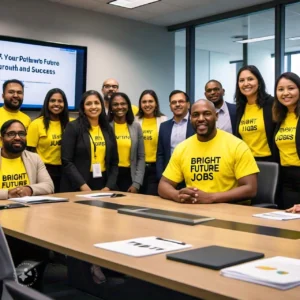Bright Future Jobs: Your Pathway to Future Growth and Success
Introduction
As the world spins in super-speed lanes of transformations thanks to technological evolutions, globalization, and societal needs, what once seemed a desired peak position can easily become obsolete overnight. As we envision our future, there are some industries shining brighter on the horizon than others that provide almost guaranteed job security for those willing to pivot and create. In this post, we take a deep dive into the mega trends that will define employment in the future and share our list of 12 industries set to skyrocket (worth your career perusal) along with researched tips on how you can best position yourself for success within each.

An Evolving Workplace Landscape
The labor market of the future will be a very different place from what we know today. Some of the key trends driving this evolution include:
Technological Advancements: The application of AI, ML, and automation are rapidly changing how businesses optimize their processes across various industries. This has increased demand for jobs related to these technologies, with AI specialists being hired in droves and more data scientists joining the workforce every day.
Global interconnectedness has made the world a more competitive and cooperative market for jobs. Those who have international business skills, cross-cultural communication know-how, and global logistics experience are particularly in demand.
Some of the most significant influences stem from changing workforce demographics – an aging population in many developed countries increases demand for healthcare professionals, while younger generations drive the gig economy and freelance work. The kind of jobs has been changing with this shift, and also the skills that are in demand.
Here are five areas of jobs that will be led to sustainable and green technologies:
Climate Change and Environmental Issues: As awareness of climate change is increasing, more companies would look into hiring people for Renewable Energy Jobs or Sustainable Development or Environment Protection roles. Agriculture and green technology, in addition, have strong positions in environmental engineering or sustainability consulting careers.
Top 10 Booming Industries for the Next Decade
If we want to choose a career, then knowing which industries are growing the most is fundamental.
Top Sectors Poised to Outshine In Years To Come
- IT and Cybersecurity
Continuing to be a growth engine fueled by the insatiable thirst for digital transformation in every sector, IT. Areas of IT that are set for future success include:
AI and ML: Transforming just about every industry from healthcare to finance. AI algorithm developers, NLP users, and robotics adepts are high in demand among the professionals of standard profiles.
Cybersecurity: As cyber threats become more and more complicated, the need for cybersecurity experts is skyrocketing. This field also has various careers such as cybersecurity analyst, ethical hacker, and information security manager.
Cloud Computing: Designing/maintaining cloud infrastructure for businesses as they move en masse to the cloud. Cloud architect and Cloud engineer are key roles.
- Healthcare and Biotechnology
Healthcare is changing, and technology has the power to dramatically shape how that transformation occurs. Primary areas of this industry include:
Telemedicine and Digital Health: The COVID-19 crisis acted as a catalyst for the adoption of telemedicine, and this trend is not going to change. Careers in telehealth coordination, digital health app development, and remote patient monitoring are quickly rising in popularity.
Biotechnology – Genetic Engineering, Personalized Medicine (Life Sciences): New frontiers are being explored in healthcare as a result of the progress made possible by biotechnological research. Biotech research, bioinformatics, and clinical trials are the most competitive positions to land.
Mental Health Services: Awareness surrounding mental health issues has driven large growth in this industry overall, particularly therapists/counselors and psychiatric nurses.
- Solar and Green Living
With the push towards a greener future, renewable energy and sustainability is one sector that’s growing at an unprecedented rate. Key career opportunities include:
Renewable Energy Engineering: Experienced professionals are required to design and set up renewable energy systems such as solar, wind, or hydroelectric power.
Environmental Science and Conservation: Careers in environmental science, conservation biology, and ecological restoration protect natural resources and help prevent climate change.
Green Build/Consulting: More businesses searching for sustainable solutions means more work in consulting. Sustainability consultants assist organizations in reducing their environmental footprint and advancing corporate social responsibility (CSR).
- Education and E-Learning
Education and learning are transforming to fulfill our needs in the digital age. Key areas include:
E-learning and EdTech: The growth of online education platforms has created opportunities in instructional designing, e-learning development, and educational technologies.
STEM (Science – Technology – Engineering – Math) Education: Teaching science, technology, engineering, and math in schools is critical to prepare the workforce of tomorrow. Careers in STEM education, curriculum development, and coordination are booming.
Special Education: There is a massive demand for special education teachers to support students with a wide variety of learning needs.
- Finance and Fintech
Technology is revolutionizing the finance sector, which means new job possibilities. Crucial areas include:
Fintech Development: Financial technology, or fintech, careers are increasing, including blockchain technology and digital coinage-based roles.
Data Analysis and Financial Planning: As data becomes more integral in decision-making, jobs related to financial analysis, analytics/data science, and financial planning are becoming important.
Regulatory Compliance: More stringent financial regulations have increased the need for compliance officers and risk management professionals.
The Future of Jobs: Skills and Education
If you want to stay ahead and excel in these emerging areas, then talent too needs the right skills and education. Consider the following actions to prepare for future jobs:
- Embrace Lifelong Learning
With lightning-speed technological change, we should be learning all the time. Taking online courses, certifications, or professional development programs helps keep up with the trends and skills.
Online Learning: Platforms like Coursera, Udacity, and LinkedIn Learning offer courses from AI to sustainability.
Certifications: Industry certifications can help increase employability, such as security-related certifications like CISSP or CEH.
- Develop Technical Skills
Tech skills are in demand in every sector. Focus on key technical skills like:
Programming/Coding: Learning languages like Python, Java, or R can pave a professional path in software development, data analysis, or AI.
Data Analysis & Visualization: Competency in tools such as Excel, SQL, and Tableau is crucial for analyzing data.
Cloud Platforms: Knowledge of cloud platforms like AWS, Google Cloud, and Microsoft Azure is essential for IT or cybersecurity careers.
- Cultivate Soft Skills
Technical skills are important, but the ways we interact and work with others can enhance or impair our effectiveness. Crucial soft skills include:
Communication: Excellent communication skills are necessary for working effectively with teammates, presenting ideas, and interacting with customers.
Critical Thinking and Problem-Solving: These skills are in demand in virtually every industry.
Flexibility: The rapid rate of change in the job market makes it mandatory for professionals to be open to changes at any given point.
- Gain Practical Experience
You cannot move forward in a solid career without practical experience. These are the ideal moments to gain work experience and build relationships.
Paid Internships: Many companies offer paid internship programs to let students experience live work.
Volunteer Work: Volunteering can provide valuable experience and demonstrate your commitment to making an impact.
How do I succeed in navigating a post-pandemic job market?
Breaking through the glass ceiling can be tough, but by focusing on these three things, you can get ahead:
- Online presence is a huge opportunity.
The capability to showcase your skills and expertise through a solid online presence is a prerequisite. Important steps include:
LinkedIn Profile: Create a complete LinkedIn profile showcasing your skills, experience, and achievements. Join industry groups and post relevant content to establish yourself as a market leader.
Personal Website/Portfolio: Creating your own website or online portfolio can help display your work, projects, and achievements, making it visible to potential employers. This is especially applicable to creative professionals like designers and writers.
- Network Effectively
Networking is important to furthering work prospects and your career. Key networking strategies include:
Industry Events: Attend industry conferences and workshops to meet professionals in your field.
Professional Associations: Join professional associations specific to your industry to network, share resources, and access job boards.
Online Communities: Get involved in online forums and communities related to your industry. Sharing your expertise and interacting with others can build trust and connections.
- Tailor Your Job Applications
It is essential to tailor your job applications to each position. Key steps include:
Tailored CVs: Create targeted and optimized CVs for each application that demonstrate your skills according to the job requirements.
Targeted Numbers: Address the job requirements with specific numbers and examples.
Value Proposition: Your cover letter should highlight a persuasive value proposition based on how you fit with the company’s needs and the role, not just the organization’s mission or team.
Follow-Up: Send a follow-up email after applying to express interest and inquire about the application status.
- Stay Informed and Adapt
Remaining aware of changes in your industry and adapting to them is key to professional longevity. Ways to stay informed include:
Industry News: Subscribe to newsletters, blogs, and publications in your industry to keep up with news and trends.
Continuous Learning: Take online courses, earn certifications, or attend workshops for professional development.
Conclusion
The future job market offers exciting growth opportunities. By being mindful of the trends driving change, targeting sectors others might overlook, and equipping yourself with the necessary skills and knowledge, you can secure a better tomorrow. Embracing lifelong learning, developing technical and soft skills, and gaining practical experience are key to future growth and success. In the times to come, only flexible and proactive individuals who are prepared will thrive in these evolving labor markets.







